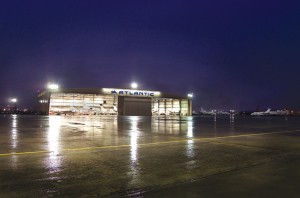By S. Clayton Moore,
The turbulent fixed base operation market continues its long march towards consolidation with the announcement of a major buyout of Trajen, one of the country’s better-known FBO networks, by well-funded Atlantic Aviation.

Industry veteran Lou Pepper, CEO of Atlantic Aviation, will lead the integration of Trajen’s FBO network into Atlantic Aviation’s operations.
In late April, MacQuarie Infrastructure Company, the parent of Dallas-based Atlantic Aviation, confirmed it has secured an agreement to acquire 100 percent of Trajen Holdings, Inc., the owner and operator of 21 FBOs in 11 states.
The acquisition will cost Australia-based MacQuarie approximately $338.1 million and will more than double the total number of Atlantic locations from 19 to 41. Trajen’s operations include FBOs in Aspen, Colo.; Austin, Texas; Orlando, Fla.; Chicago; and two sites in the San Francisco Bay Area. The average remaining lease life on Trajen’s FBOs is 20.6 years, according to MIC.
“Trajen’s locations dovetail nicely with Atlantic’s existing operations and give us the opportunity to further capitalize on our strong, nationwide network,” said Peter Stokes, CEO of MIC. “We expect the combined operations to produce significant growth in distributable cash. The Trajen operations are well positioned in their respective markets, and the sites are up to date and appropriate for the operations conducted there. We expect to incur below-average maintenance capital expenditures in the near term, with respect to these facilities.”
Trajen, owned by limited partnerships managed by Houston-based CapStreet Group, LLC, was founded in 1992 to provide aviation support to the U.S. military. It opened its first commercial aviation enterprise in 1995, with the creation of Trajen Flight Support in Sacramento, and quickly built up a network of FBOs extending from Pennsylvania to Alaska. It’s the sole FBO at nine of the 21 airports it operates.

Much of Atlantic Aviation’s success can be credited to Sue Sommers, vice president of sales and marketing, who says the “Atlantic Attitude” towards customer service makes all the difference.
Atlantic began as a family-owned aviation business that dates back to the early days of flight. It became a major force on the FBO landscape with the addition in 2000 of experienced aviation industry veteran Lou Pepper, who formerly owned and managed Million Air Interlink, the franchisee of the well-known Million Air chain of FBOs. Strongly supported by Sue Sommers, Atlantic’s vice president of sales and marketing, Pepper has led the company through its ambitious and historic growth.
The acquisition should close during the third quarter of 2006; Atlantic expects to augment key locations with additional management staff. MacQuarie spokesmen Alex Doughty said that Atlantic’s management was still working out the details of its impending expansion.
“As the deal was only recently announced, it’s a little premature to talk in detail on specific aspects of the transaction, including integration plans,” he said.
It’s likely that Pepper will oversee the assimilation of Trajen’s portfolio, a task he has taken on before. Atlantic had already experienced a significant growth spurt last year when it absorbed five FBOs and a heliport previously managed by AvCenters, another wholly owned subsidiary of MIC. Pepper was responsible for successfully merging AvCenters’ locations into Atlantic’s operations.
A strong proponent of the historic Atlantic brand, Pepper believes the new acquisition will make the company stronger than ever.
“The addition of the Trajen portfolio is a monumental development for Atlantic and our customers,” Pepper said. “With no overlap between our existing locations, all 21 additional FBOs will combine to provide a huge choice of destinations to our customers, offering the same Atlantic quality of service they know and expect.”

Atlantic Aviation, which runs large facilities like this hangar at Houston’s Hobby Airport, will double its portfolio of FBOs.
MacQuarie will finance the deal with $180 million in loans from lenders to its airport businesses and another $180 million from other sources. In addition to the $338.1 million purchase price, MIC also expects to incur costs and expenses of about $22.5 million, including transaction and integration costs.
Trajen is also buying two more operations that will be part of the sale to MacQuarie, bringing the total number of Atlantic operations to 43 by year’s end.
“The combined operations will allow us to offer our customers an even broader array of service options,” Pepper said.
MIC owns, operates and invests in a diversified group of infrastructure businesses that encompass airport services, airport parking and several UK operations, including a toll road and a clean water utility. It’s backed by and is an arm of financial giant Macquarie Bank of Australia.
The company is just one of several private equity firms that have been bankrolling FBO acquisitions nationwide. They include Centre Partners, which is backing Ross Aviation of Denver in its pursuit of FBOs across the west and southwest, and the Carlyle Group, which has sunk significant funds into Landmark Aviation’s ambitious plan to integrate FBO and maintenance and repair operations across a nationwide network.
Because the FBO business has traditionally been fragmented with large numbers of independent operators, it has become an attractive target for investors looking for greater returns than are possible with more solidified industries. So far, the theory that FBOs can be run for greater profit by combining accounting, human resources, billing and other logistical operations, as well as leveraging increased buying power, seems to be proven out by the success of chains like Landmark, Ross Aviation, and Atlantic. It remains to be seen what effect high fuel prices and other challenges may present to the evolving FBO chains.
For more information on Atlantic Aviation, visit [http://www.atlanticaviation.com]. For information on MacQuarie Infrastructure, visit [http://www.macquarie.com/mic].











